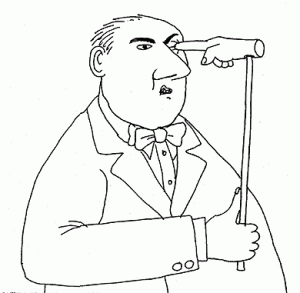Service with a Simile

How important can service really be?
Think about decisions you have made based on relatively small experiences. That shop you don’t visit anymore because it’s always so difficult to get served. Maybe it’s the DIY chain where you ask for help on plumbing at the information desk and following the obligatory Tannoy call you get to spend ten minutes staring into the middle distance waiting for anyone to respond. The pub where the food is ok, but the difficulty over ordering it is enough to make you want to try elsewhere.
Personally, I have avoided large supermarket chains because of what seemed a poor response when I had a complaint, or the apparent indifference of the checkout operator.
On an even larger scale I won’t return to a certain popular holiday destination, because whilst It was a lovely warm country with nice hotels and good food, many of the restaurant and shop staff were rude and pushy. This is probably a cultural difference and you could argue that they need to compete to earn a living, and that may be true. The truth of it for me though is that there is a choice of countries to holiday in and I do not have to choose that one. One or two small experiences fifteen years ago, has changed my perception of a whole country and instead I have returned time and again to a different part of the World where I enjoy the service and always feel welcome.
In quite literal terms 3 bad waiters and a pushy souvenir salesman have altered the course of my life, and how my children have experienced different cultures growing up.
Do you still think that the guy on the till having an off day has no effect on the people that shop with you?
Now, do not get me wrong, I’m not looking for a long-term relationship, or to become best buddies with my Barista. But it should not feel so good when I have service from someone who is warm, engaged and enthusiastic about helping me, it should be a standard, and yet it still comes as a pleasant surprise.
Think back about the few times when you were genuinely impressed with the genuine warmth and care shown to you when making a purchase or going out for a meal. Even in little interactions at the checkout or mundane day-to-day comments that oiled the wheels of your life a little. For most people, their experiences are memorable simply because they are isolated islands in the general ocean of average service.
I cannot think but that you could take over the world if you had an army that fought for hearts and minds as assiduously as they battled with weaponry.
Taking a step back from being a consumer, I have seen managers tell staff to ‘go out and be nice to people, to give great service and smile at everyone’ whilst the managers maintain an unremittingly sour expression themselves.
The truth is that you can attract great people that come to a new job in the expectation of giving great service and having a genuine interaction with customers, but that the ethos of the company either grinds this out of them, or they up and leave for somewhere that more suits their values.
Creating a company-wide service culture cannot exist just in the isolation of the parts that face the public. Everyone has to buy into it. From the very top of the tree everyone must live the idea of making things better by motivating those around and below them, by being responsive and engaging. Unless it exists all the way up an organisation, somewhere at the part of the tree that it stops the rot spreads.

Now, that sounds like a lot of work and a hard sell, considering the often entrenched attitudes of staff that may have been in place for 20 years. But, in fact this does not come as a shock to anyone. If you were to hold a training course about how it hurts to poke yourself in the eye, most people would readily buy into it, because they know just how it feels. Everyone feels the same about service, they live it throughout their lives, but seem to exist in a bubble when it comes to how they, themselves behave, even though they appreciate that it can feel just like a poke in the eye, and learned painful experience is not readily repeated.
Think about how you would like your front line staff to behave with every customer. Then think about the kind of management motivation, and interaction, that would make them feel valued enough to behave like this. Then look at the levels of management and how the values would need to be lived in order for them to trickle down from the top to the bottom. Imagine treating the aspiration of service at every level like you treat honesty or attendance or anything else that’s desirable and measurable.
When you can imagine that, and it seems like you could conquer the world, hold that thought, and talk to us.
Get in touch